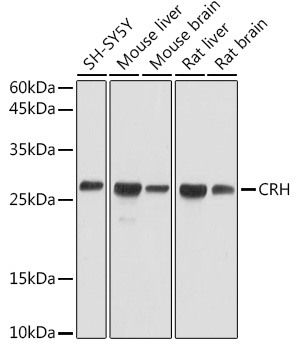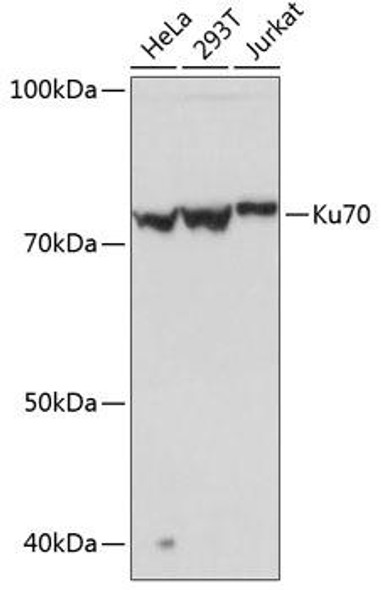Cell Biology Antibodies 2
Anti-CRH Antibody (CAB1122)
- SKU:
- CAB1122
- Product Type:
- Antibody
- Reactivity:
- Human
- Reactivity:
- Mouse
- Reactivity:
- Rat
- Host Species:
- Rabbit
- Isotype:
- IgG
- Antibody Type:
- Polyclonal Antibody
- Research Area:
- Cell Biology
Description
| Antibody Name: | Anti-CRH Antibody |
| Antibody SKU: | CAB1122 |
| Antibody Size: | 20uL, 50uL, 100uL |
| Application: | WB IHC |
| Reactivity: | Human, Mouse, Rat |
| Host Species: | Rabbit |
| Immunogen: | Recombinant fusion protein containing a sequence corresponding to amino acids 25-194 of human CRH (NP_000747.1). |
| Application: | WB IHC |
| Recommended Dilution: | WB 1:500 - 1:2000 IHC 1:50 - 1:200 |
| Reactivity: | Human, Mouse, Rat |
| Positive Samples: | SH-SY5Y, Mouse liver, Mouse brain, Rat liver, Rat brain |
| Immunogen: | Recombinant fusion protein containing a sequence corresponding to amino acids 25-194 of human CRH (NP_000747.1). |
| Purification Method: | Affinity purification |
| Storage Buffer: | Store at -20'C. Avoid freeze / thaw cycles. Buffer: PBS with 0.02% sodium azide, 50% glycerol, pH7.3. |
| Isotype: | IgG |
| Sequence: | LLSR GPVP GARQ APQH PQPL DFFQ PPPQ SEQP QQPQ ARPV LLRM GEEY FLRL GNLN KSPA APLS PASS LLAG GSGS RPSP EQAT ANFF RVLL QQLL LPRR SLDS PAAL AERG ARNA LGGH QEAP ERER RSEE PPIS LDLT FHLL REVL EMAR AEQL AQQA HSNR KLME II |
| Gene ID: | 1392 |
| Uniprot: | P06850 |
| Cellular Location: | Secreted |
| Calculated MW: | 21kDa |
| Observed MW: | 30kDa |
| Synonyms: | CRH, CRF, CRH1 |
| Background: | This gene encodes a member of the corticotropin-releasing factor family. The encoded preproprotein is proteolytically processed to generate the mature neuropeptide hormone. In response to stress, this hormone is secreted by the paraventricular nucleus (PVN) of the hypothalamus, binds to corticotropin releasing hormone receptors and stimulates the release of adrenocorticotropic hormone from the pituitary gland. Marked reduction in this protein has been observed in association with Alzheimer's disease. Autosomal recessive hypothalamic corticotropin deficiency has multiple and potentially fatal metabolic consequences including hypoglycemia and hepatitis. In addition to production in the hypothalamus, this protein is also synthesized in peripheral tissues, such as T lymphocytes, and is highly expressed in the placenta. In the placenta it is a marker that determines the length of gestation and the timing of parturition and delivery. A rapid increase in circulating levels of the hormone occurs at the onset of parturition, suggesting that, in addition to its metabolic functions, this protein may act as a trigger for parturition. |
| UniProt Protein Function: | CRH: This hormone from hypothalamus regulates the release of corticotropin from pituitary gland. Belongs to the sauvagine/corticotropin-releasing factor/urotensin I family. |
| UniProt Protein Details: | Protein type:Secreted, signal peptide; Secreted Chromosomal Location of Human Ortholog: 8q13 Cellular Component: extracellular space; cytoplasm; extracellular region; perikaryon Molecular Function:corticotropin-releasing hormone receptor 1 binding; neuropeptide hormone activity; protein binding; hormone activity; corticotropin-releasing hormone receptor 2 binding; adrenocorticotropin-releasing hormone activity; receptor binding Biological Process: negative regulation of circadian sleep/wake cycle, REM sleep; diterpenoid metabolic process; synaptic transmission, dopaminergic; hypothalamus development; positive regulation of cortisol secretion; induction of apoptosis by hormones; response to pain; female pregnancy; signal transduction; positive regulation of adrenocorticotropic hormone secretion; negative regulation of luteinizing hormone secretion; synaptic transmission; learning and/or memory; positive regulation of cell proliferation; positive regulation of cAMP biosynthetic process; feeding behavior; negative regulation of blood pressure; parturition; inflammatory response; response to electrical stimulus; associative learning; response to corticosterone stimulus; response to drug; adrenal gland development; response to ether; response to ethanol; long-term memory; response to estrogen stimulus; ion homeostasis; regulation of serotonin secretion; negative regulation of epinephrine secretion; positive regulation of protein amino acid phosphorylation; glucocorticoid biosynthetic process; lung development Disease: Acth Deficiency, Isolated |
| NCBI Summary: | Corticotropin-releasing hormone is secreted by the paraventricular nucleus (PVN) of the hypothalamus in response to stress. Marked reduction in this protein has been observed in association with Alzheimer disease and autosomal recessive hypothalamic corticotropin deficiency has multiple and potentially fatal metabolic consequences including hypoglycemia and hepatitis. In addition to production in the hypothalamus, this protein is also synthesized in peripheral tissues, such as T lymphocytes and is highly expressed in the placenta. In the placenta it is a marker that determines the length of gestation and the timing of parturition and delivery. A rapid increase in circulating levels of the hormone occurs at the onset of parturition, suggesting that, in addition to its metabolic functions, this protein may act as a trigger for parturition. [provided by RefSeq, Apr 2010] |
| UniProt Code: | P06850 |
| NCBI GenInfo Identifier: | 117445 |
| NCBI Gene ID: | 1392 |
| NCBI Accession: | P06850.1 |
| UniProt Secondary Accession: | P06850,B3KQS4, |
| UniProt Related Accession: | P06850 |
| Molecular Weight: | 196 |
| NCBI Full Name: | Corticoliberin |
| NCBI Synonym Full Names: | corticotropin releasing hormone |
| NCBI Official Symbol: | CRH |
| NCBI Official Synonym Symbols: | CRF; CRH1 |
| NCBI Protein Information: | corticoliberin; corticotropin-releasing factor |
| UniProt Protein Name: | Corticoliberin |
| UniProt Synonym Protein Names: | Corticotropin-releasing factor; CRF; Corticotropin-releasing hormone |
| Protein Family: | Corticoliberin |
| UniProt Gene Name: | CRH |
| UniProt Entry Name: | CRF_HUMAN |






![Anti-TLR4 Antibody (CAB11226)[KO Validated] Anti-TLR4 Antibody (CAB11226)[KO Validated]](https://cdn11.bigcommerce.com/s-rd6ounxcu2/images/stencil/590x590/products/39101/43847/anti-tlr4-antibody-cab11226ko-validated__41474__10307.1706521206.jpg?c=1)
